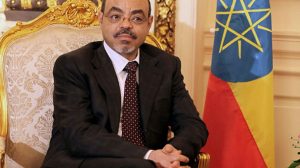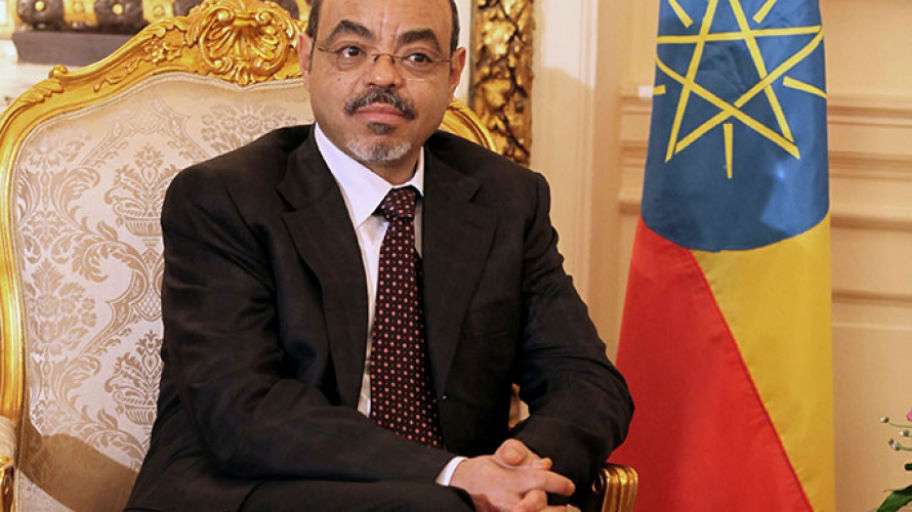
By Duop Chak Wuol
August 20, 2017 (SSNA) — Waging an armed struggle against your own country is probably one of the toughest decisions a man could make. However, there are political, cultural, and social issues that might lead one to declare a war against a state, and this is exactly what the late Ethiopian Prime Minister Meles Zenawi decided to do in 1975. His decision changed Ethiopia forever, both socially and economically.
I would like to first admit that praising one who passed is typically done by people who had close ties to the person or knew the person well. However, my conscience compels me to write this piece about late Ethiopian leader Meles during the fifth anniversary of his death.
After the Tigrayan People’s Liberation Front (TPLF) successfully deposed former Ethiopian communist dictator Mengistu Haile Mariam in May 1991, Meles surprised The World Bank and other global financial institutions by rejecting hundreds of millions of dollars that were offered to Ethiopia in the form of a loan. His main reason for refusing to take the loans was that the conditions of the loans were not compatible with Ethiopia’s economy at the time.
He was right to refuse: the loan would have placed Ethiopia at a greater economic disadvantage, given the fact that interests associated with the loans were too high.
Under the leadership of Mengistu, Ethiopia was synonymous with poverty and famine. The Red Terror Mengistu waged against Ethiopians in 1977-1979 resulted in the death of thousands of Ethiopians who opposed his regime. It was a tragic incidence.
However, Meles’ efforts helped eliminate such a perception. He eliminated poverty by expanding Ethiopia’s agricultural sector and investing in small farming. Ethiopia’s economy is now booming because of his ideas. Meles also correctly identified that dependence on foreign aid does not progress the nation’s economy. He was a strategic decision-maker who pushed for Ethiopia to effectively utilize its own natural resources.
As someone who once studied in Ethiopia, I witnessed Ethiopians who were living under extreme tyranny. Mengistu’s rule was a pure dictatorship that also limited his people’s freedom of movement.
If one were to study the late Ethiopian leader Meles, they would conclude that he was indisputably a brilliant strategic thinker. One of Meles’ political achievements was the inclusion of Ethiopians whose ethnicities were theoretically outlawed by Mengistu from Ethiopia’s politics. I recall listening to a song from certain Ethiopian nationalities, other than those in Amharic, which was seen as being in direct opposition to leadership. The oppression used by former Ethiopia’s dictator was simply too broad and ruthless.
Meles Zenawi once said: “We have our own script. We have our own calendar. We represent the greatness of Africa’s past. We also represent the worst of Africa’s present, in terms of poverty. It is the best and the worst of African reality.”
Africa lacks leaders with the mentality of Meles. The continent will probably remain undeveloped for many decades, perhaps centuries, if its leaders stick to the old mentality of focusing their energies on staying in power for life rather than developing their countries.
The late Ethiopian leader proved that he was fighting for a reason, with strategies that he used successfully. Ethiopia is now the East African economic powerhouse, a notion that was unthinkable under Mengistu’s rule. I believe Africa would prosper if its leaders adopted Meles’ economic ideas.
Meles’ economic thoughts are revered throughout Africa and around the world. For example, the thriving Rwandan economy was a brainchild of Meles. The Rwandan President Paul Kagame copied Meles’s economic ideas, which allowed his country’s economy to prosper. Meles’s policy of development, elimination of poverty, and the pursuit of economic growth for Ethiopia changed his country for the better. His sudden passing in August 2012 left millions of Africans stunned. His decision to wage a war against Mengistu’s was morally right. He fought, won, and implemented the ideas he was fighting for. He was a hero for Ethiopia, Africa, and the world. Meles was truly a brilliant strategic African thinker gone too soon.
Duop Chak Wuol is an Analyst and Editor-in-Chief of the South Sudan News Agency . He can be reached at [email protected].


6 Comments. Leave new
Very true, this article it’s useful. If the Ethiopian prime minister Meles Zenawi was alive, the problem of South Sudan genocided should be stopped from now on. His the only one man had the visions in all Africa. Ethiopian forgot their civil war in 1991 with Eritrean, who help them that time? It’s was the region 12 Nuer, Anyauk, and other small tribes from Gambella who was defeated the Eritrean. If not believed ask the prime minister of Ethiopia.
Who been fighting Somalia Alshaba or who been protected the border between South Sudan and North Sudan, when they signed the CPA in 2005? It’s was Africa Union force and we’re they come from, it’s was Nuer from Ethiopian region 12 called Gambella. East Africa will never learn, it’s going to be an time soon when all Africa dictatorship nation fall to end , followed by South Sudan Civil war. Uganda should be worried for involved to South Sudan genocide in December 15, 2013. Million poor Sudanese are dying with famines.
good comment
Let other Autocratic African leaders such as Esayas Afewerk, Mugabe, Keniyata, Museveni, Kiir, etc follow his way.
great job wonderful article
Thanks for the wonderful article